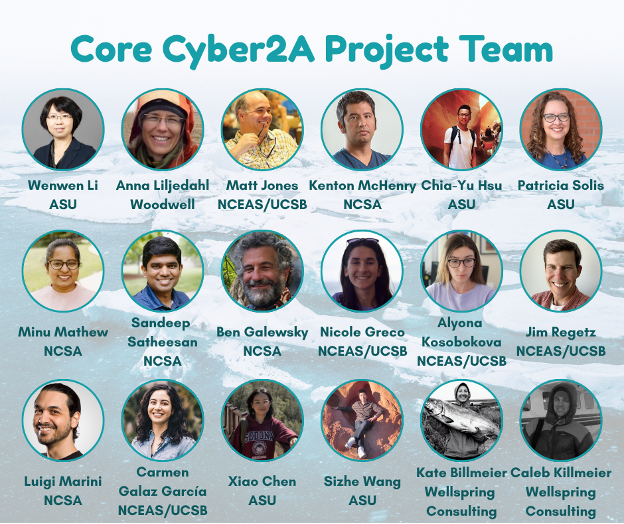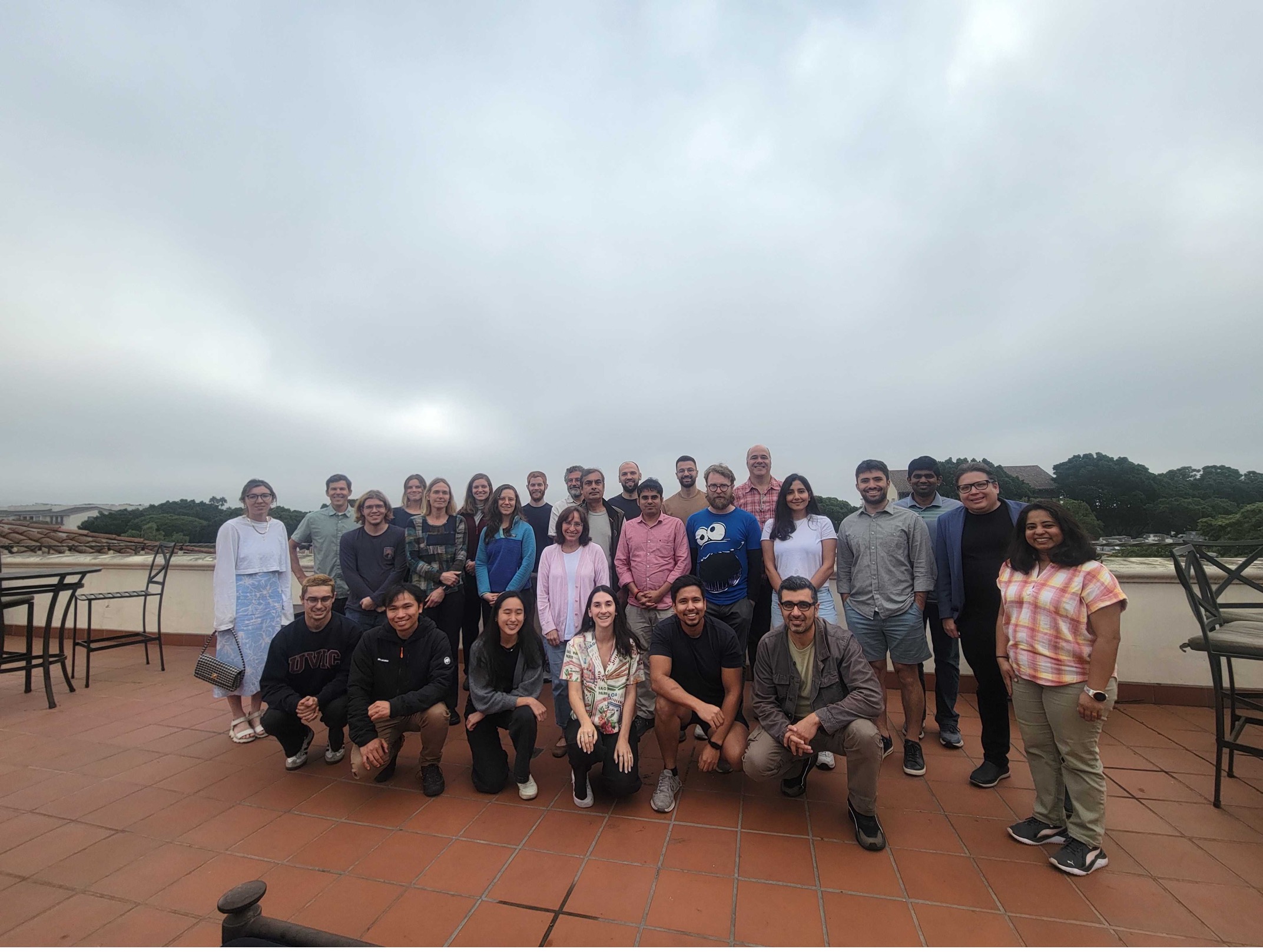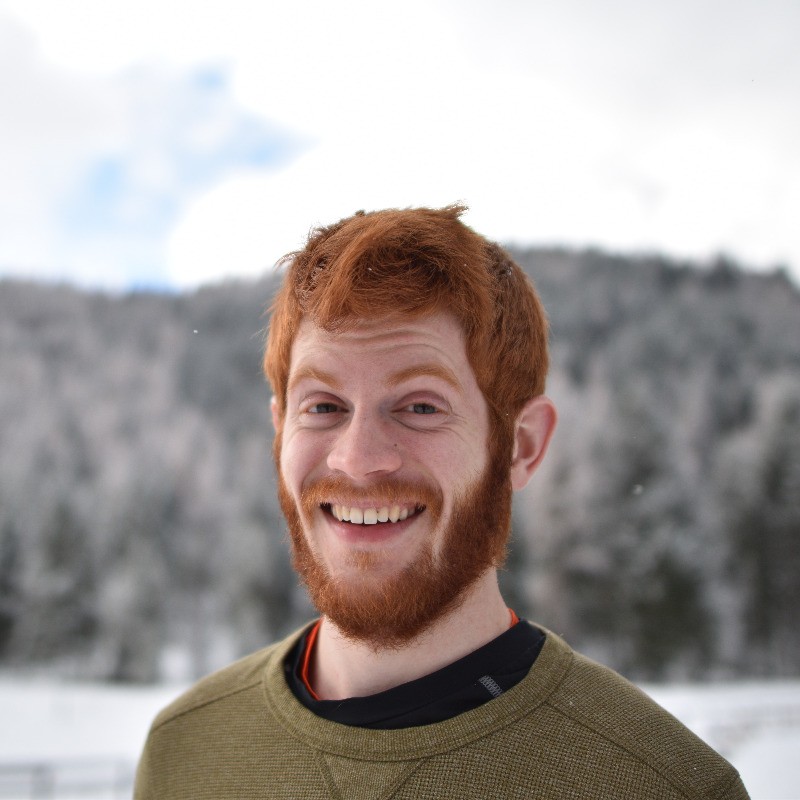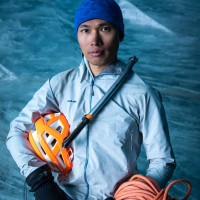Artificial intelligence (AI) and machine learning (ML) play an increasingly crucial role in Earth science teaching and research by accelerating large data analyses, data interpretation, enhancing predictive models, and making complex environmental processes more accessible to students and researchers alike. The NSF-funded Cyber2A project is a collaboration between Arizona State University (ASU), Woodwell Climate Research Center, the Arctic Data Center, and the National Center for Supercomputing Applications (NCSA) that aims to expand the Arctic-AI research network, develop customized training materials, webinars, and in-person workshops, and create a sustainable and scalable learning community.

Webinars
The Cyber2A team has held four webinars, and recordings for each can be found here:
- A Framework for Building and Finetuning Geospatial Foundation Models
- Learning Neural Representations of our Planet from Earth Observation Data
- Hyper-Spatial Remote Sensing
- Arctic Infrastructure Mapping with AI
The fifth webinar will be held on August 18th, 2025 and will cover Semantic Enrichment and LLM-Driven Analytics to the Mindal Open Data Portal by Dr. Xiaogang Ma. Register here!
The First Cyber2A Workshop
In October 2024, 20 Arctic researchers and 7 instructors gathered in Santa Barbara, CA at the National Center for Ecological Analysis and Synthesis (NCEAS) for the first NSF Cyber2A workshop to learn more about incorporating AI and ML techniques into their research. Topics covered in this workshop included AI fundamentals and tools, AI-ready data, data annotation, neural networks and deep learning, AI ethics, reproducibility, and more. Participants’ research and experiences varied widely. While some researchers are focusing on sea ice and ice-sheet dynamics, others are studying similarities between the Arctic and otherworldly bodies such as Europa. All participants had one thing in common- their interest in using AI and ML to further their research.

Arctic researchers and instructors gather in Santa Barbara, CA for the first NSF Cyber2A workshop in October 2024.
Openly Accessible Curriculum
Interested in learning more about using ML and AI in your research? Visit the Cyber2A coursebook to access all open-source materials from the workshop. We are enhancing our step-by-step AI training materials with lectures and code to support self-paced learning and lifelong learners, wherever you are in the world.
2025 Workshop
Building on the success of our first workshop, we are excited to announce the upcoming second Cyber2A workshop to take place in Santa Barbara, CA: Scaling Impact: Co-Creating a Shared Framework for Teaching AI and Machine Learning with Applications in Arctic Research.
This year’s workshop will be highly collaborative and discussion-based and will bring together faculty, teachers, and researchers with an interest in AI/ML teaching in the geosciences to collaboratively improve and expand upon last year’s curriculum while designing an extensible framework for delivering training in different course formats. The expected outcome of this workshop is a modular set of instructional materials and supporting guidance that educators can use to teach AI/ML techniques to environmental and geoscience researchers, and that self-motivated learners can use themselves to develop useful skills directly. While the instructional materials of the workshop will focus on Arctic research contexts, we invite applications from individuals across a range of disciplines, professional backgrounds, and career stages who are actively engaged in the application of AI and ML in their teaching.
Objectives include:
- Reviewing foundational and advanced AI/ML applications relevant to geoscience research (e.g., feature detection using computer vision models, text analysis using large language models)
- Developing pedagogical strategies for teaching AI/ML techniques to interdisciplinary research teams and students
- Promoting open science practices and ethical AI use
- Fostering a network of trained educators who can continue to build capacity within their institutions and regions
- Collaborating on reviewing, designing, and creating reusable AI/ML training content
Support is provided by the Cyber2A awards (#2230034 and #2230035) from NSF and we have limited funds to support travel and accommodations for onsite courses. Applications for this year’s workshop will close on July 14th, 2025. Application decisions will be made by the end of July.
Testimonials From Our Alumni

“I found the Cyber2A workshop to be very helpful and particularly relevant to my research. Currently, I am exploring the capability of using Deep Learning U-net models to incorporate information about atmospheric NOx from satellites, reanalysis, and surface measurements to make predictions that could inform air quality forecasts. Our hope is to investigate whether machine learning could offer a less computationally expensive option for such forecasts at high resolutions.”
– Mikhail Schee, Postdoctoral Fellow at the University of Toronto

Since attending, I’ve been developing a KMeans-based method to classify glacier surface conditions using Sentinel-2 imagery. This unsupervised approach has helped me label snow, ice, and land areas, which I then use to train supervised machine learning classifiers to estimate snow cover ratios and snowline altitudes across the Canadian Arctic.
– Wai-Yin Cheung, PhD Candidate at Queen’s University
